
devika
Devika is an Agentic AI Software Engineer that can understand high-level human instructions, break them down into steps, research relevant information, and write code to achieve the given objective. Devika aims to be a competitive open-source alternative to Devin by Cognition AI.
Stars: 18072

Devika is an advanced AI software engineer that can understand high-level human instructions, break them down into steps, research relevant information, and write code to achieve the given objective. Devika utilizes large language models, planning and reasoning algorithms, and web browsing abilities to intelligently develop software. Devika aims to revolutionize the way we build software by providing an AI pair programmer who can take on complex coding tasks with minimal human guidance. Whether you need to create a new feature, fix a bug, or develop an entire project from scratch, Devika is here to assist you.
README:
[!IMPORTANT]
This project is currently in a very early development/experimental stage. There are a lot of unimplemented/broken features at the moment. Contributions are welcome to help out with the progress!
- About
- Key Features
- System Architecture
- Getting Started
- Configuration
- Contributing
- Help and Support
- License
Devika is an advanced AI software engineer that can understand high-level human instructions, break them down into steps, research relevant information, and write code to achieve the given objective. Devika utilizes large language models, planning and reasoning algorithms, and web browsing abilities to intelligently develop software.
Devika aims to revolutionize the way we build software by providing an AI pair programmer who can take on complex coding tasks with minimal human guidance. Whether you need to create a new feature, fix a bug, or develop an entire project from scratch, Devika is here to assist you.
[!NOTE] Devika is modeled after Devin by Cognition AI. This project aims to be an open-source alternative to Devin with an "overly ambitious" goal to meet the same score as Devin in the SWE-bench Benchmarks... and eventually beat it?
https://github.com/stitionai/devika/assets/26198477/cfed6945-d53b-4189-9fbe-669690204206
- 🤖 Supports Claude 3, GPT-4, Gemini, Mistral , Groq and Local LLMs via Ollama. For optimal performance: Use the Claude 3 family of models.
- 🧠 Advanced AI planning and reasoning capabilities
- 🔍 Contextual keyword extraction for focused research
- 🌐 Seamless web browsing and information gathering
- 💻 Code writing in multiple programming languages
- 📊 Dynamic agent state tracking and visualization
- 💬 Natural language interaction via chat interface
- 📂 Project-based organization and management
- 🔌 Extensible architecture for adding new features and integrations
Read README.md for the detailed documentation.
Version's requirements
- Python >= 3.10 and < 3.12
- NodeJs >= 18
- bun
- Install uv - Python Package manager download
- Install bun - JavaScript runtime download
- For ollama ollama setup guide (optinal: if you don't want to use the local models then you can skip this step)
- For API models, configure the API keys via setting page in UI.
To install Devika, follow these steps:
- Clone the Devika repository:
git clone https://github.com/stitionai/devika.git
- Navigate to the project directory:
cd devika - Create a virtual environment and install the required dependencies (you can use any virtual environment manager):
uv venv # On macOS and Linux. source .venv/bin/activate # On Windows. .venv\Scripts\activate uv pip install -r requirements.txt
- Install the playwright for browsering capabilities:
playwright install --with-deps # installs browsers in playwright (and their deps) if required - Start the Devika server:
python devika.py
- if everything is working fine, you see the following output:
root: INFO : Devika is up and running!
- Now, for frontend, open a new terminal and navigate to the
uidirectory:cd ui/ bun install bun run start - Access the Devika web interface by opening a browser and navigating to
http://127.0.0.1:3001
To start using Devika, follow these steps:
- Open the Devika web interface in your browser.
- To create a project, click on 'select project' and then click on 'new project'.
- Select the search engine and model configuration for your project.
- In the chat interface, provide a high-level objective or task description for Devika to work on.
- Devika will process your request, break it down into steps, and start working on the task.
- Monitor Devika's progress, view generated code, and provide additional guidance or feedback as needed.
- Once Devika completes the task, review the generated code and project files.
- Iterate and refine the project as desired by providing further instructions or modifications.
Devika requires certain configuration settings and API keys to function properly:
when you first time run Devika, it will create a config.toml file for you in the root directory. You can configure the following settings in the settings page via UI:
-
API KEYS
-
BING: Your Bing Search API key for web searching capabilities. -
GOOGLE_SEARCH: Your Google Search API key for web searching capabilities. -
GOOGLE_SEARCH_ENGINE_ID: Your Google Search Engine ID for web searching using Google. -
OPENAI: Your OpenAI API key for accessing GPT models. -
GEMINI: Your Gemini API key for accessing Gemini models. -
CLAUDE: Your Anthropic API key for accessing Claude models. -
MISTRAL: Your Mistral API key for accessing Mistral models. -
GROQ: Your Groq API key for accessing Groq models. -
NETLIFY: Your Netlify API key for deploying and managing web projects.
-
-
API_ENDPOINTS
-
BING: The Bing API endpoint for web searching. -
GOOGLE: The Google API endpoint for web searching. -
OLLAMA: The Ollama API endpoint for accessing Local LLMs. -
OPENAI: The OpenAI API endpoint for accessing OpenAI models.
-
Make sure to keep your API keys secure and do not share them publicly. For setting up the Bing and Google search API keys, follow the instructions in the search engine setup
We welcome contributions to enhance Devika's capabilities and improve its performance. To contribute, please see the CONTRIBUTING.md file for steps.
If you have any questions, feedback, or suggestions, please feel free to reach out to us. you can raise an issue in the issue tracker or join the discussions for general discussions.
We also have a Discord server for the Devika community, where you can connect with other users, share your experiences, ask questions, and collaborate on the project. To join the Devika community Discord server, click here.
Devika is released under the MIT License. See the LICENSE file for more information.
We hope you find Devika to be a valuable tool in your software development journey. If you have any questions, feedback, or suggestions, please don't hesitate to reach out. Happy coding with Devika!
For Tasks:
Click tags to check more tools for each tasksFor Jobs:
Alternative AI tools for devika
Similar Open Source Tools

devika
Devika is an advanced AI software engineer that can understand high-level human instructions, break them down into steps, research relevant information, and write code to achieve the given objective. Devika utilizes large language models, planning and reasoning algorithms, and web browsing abilities to intelligently develop software. Devika aims to revolutionize the way we build software by providing an AI pair programmer who can take on complex coding tasks with minimal human guidance. Whether you need to create a new feature, fix a bug, or develop an entire project from scratch, Devika is here to assist you.
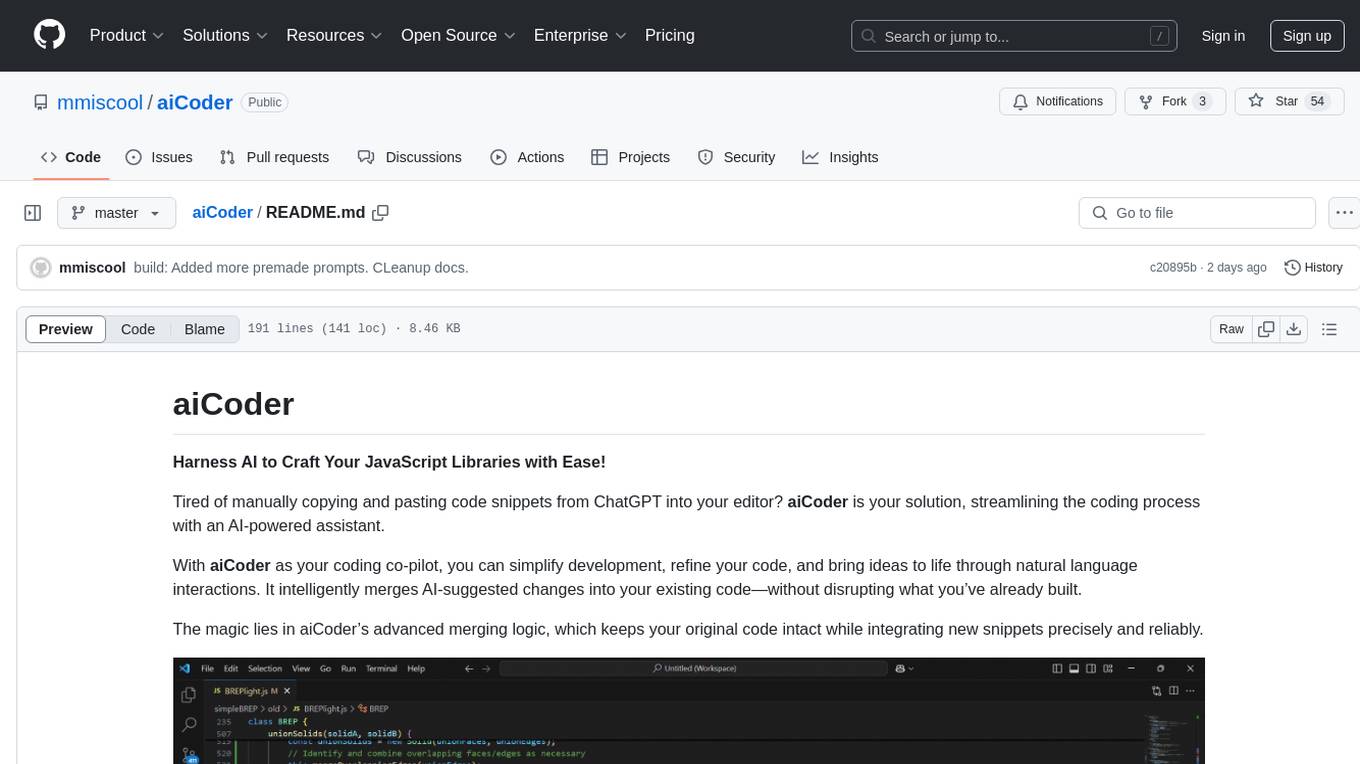
aiCoder
aiCoder is an AI-powered tool designed to streamline the coding process by automating repetitive tasks, providing intelligent code suggestions, and facilitating the integration of new features into existing codebases. It offers a chat interface for natural language interactions, methods and stubs lists for code modification, and settings customization for project-specific prompts. Users can leverage aiCoder to enhance code quality, focus on higher-level design, and save time during development.

raggenie
RAGGENIE is a low-code RAG builder tool designed to simplify the creation of conversational AI applications. It offers out-of-the-box plugins for connecting to various data sources and building conversational AI on top of them, including integration with pre-built agents for actions. The tool is open-source under the MIT license, with a current focus on making it easy to build RAG applications and future plans for maintenance, monitoring, and transitioning applications from pilots to production.

agentok
Agentok Studio is a visual tool built for AutoGen, a cutting-edge agent framework from Microsoft and various contributors. It offers intuitive visual tools to simplify the construction and management of complex agent-based workflows. Users can create workflows visually as graphs, chat with agents, and share flow templates. The tool is designed to streamline the development process for creators and developers working on next-generation Multi-Agent Applications.

promptflow
**Prompt flow** is a suite of development tools designed to streamline the end-to-end development cycle of LLM-based AI applications, from ideation, prototyping, testing, evaluation to production deployment and monitoring. It makes prompt engineering much easier and enables you to build LLM apps with production quality.
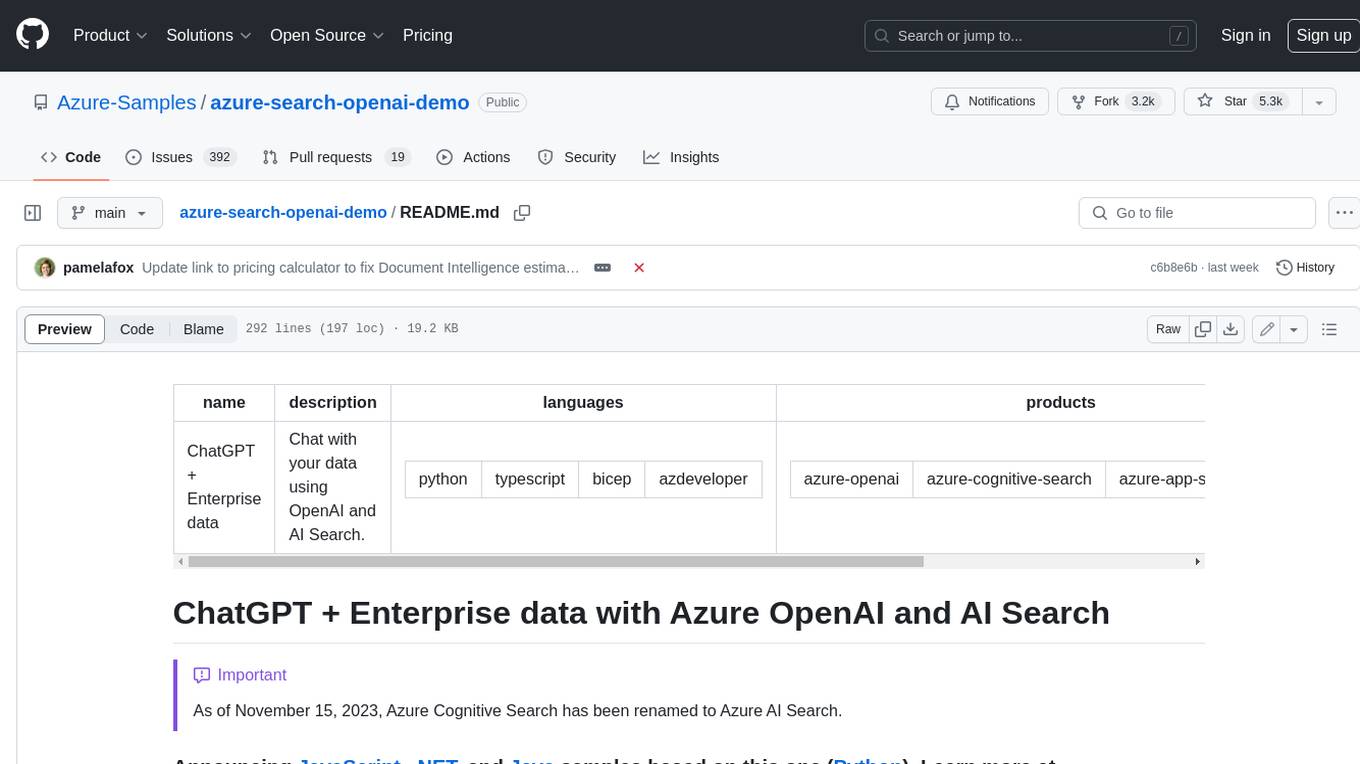
azure-search-openai-demo
This sample demonstrates a few approaches for creating ChatGPT-like experiences over your own data using the Retrieval Augmented Generation pattern. It uses Azure OpenAI Service to access a GPT model (gpt-35-turbo), and Azure AI Search for data indexing and retrieval. The repo includes sample data so it's ready to try end to end. In this sample application we use a fictitious company called Contoso Electronics, and the experience allows its employees to ask questions about the benefits, internal policies, as well as job descriptions and roles.

LLMStack
LLMStack is a no-code platform for building generative AI agents, workflows, and chatbots. It allows users to connect their own data, internal tools, and GPT-powered models without any coding experience. LLMStack can be deployed to the cloud or on-premise and can be accessed via HTTP API or triggered from Slack or Discord.
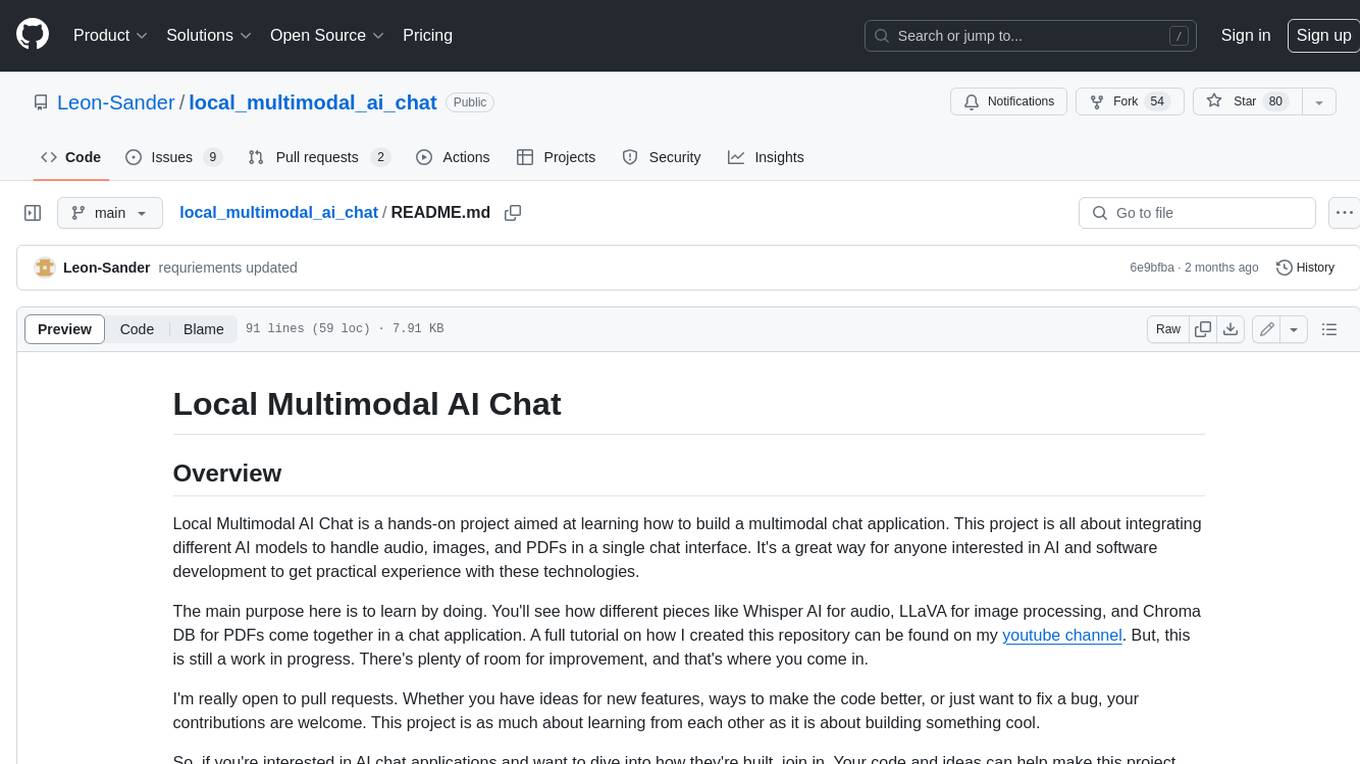
local_multimodal_ai_chat
Local Multimodal AI Chat is a hands-on project that teaches you how to build a multimodal chat application. It integrates different AI models to handle audio, images, and PDFs in a single chat interface. This project is perfect for anyone interested in AI and software development who wants to gain practical experience with these technologies.
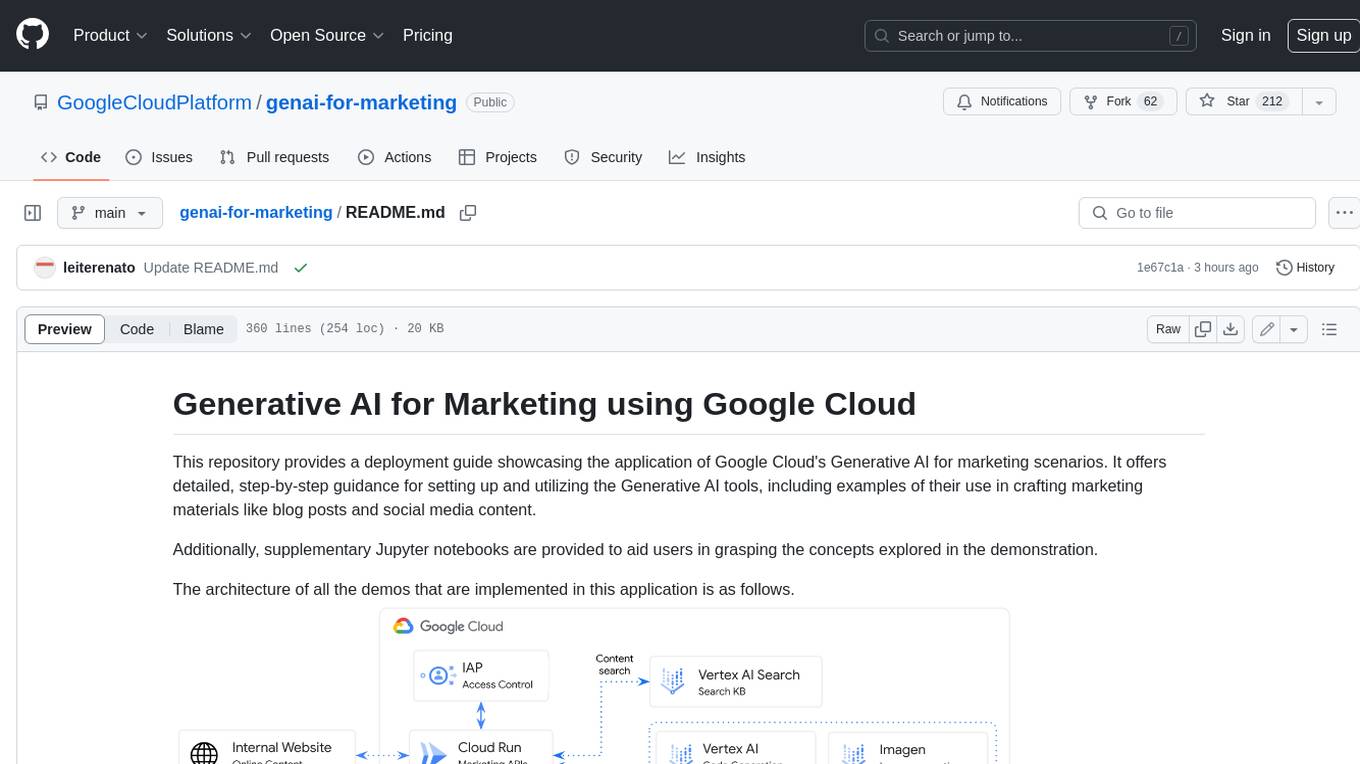
genai-for-marketing
This repository provides a deployment guide for utilizing Google Cloud's Generative AI tools in marketing scenarios. It includes step-by-step instructions, examples of crafting marketing materials, and supplementary Jupyter notebooks. The demos cover marketing insights, audience analysis, trendspotting, content search, content generation, and workspace integration. Users can access and visualize marketing data, analyze trends, improve search experience, and generate compelling content. The repository structure includes backend APIs, frontend code, sample notebooks, templates, and installation scripts.
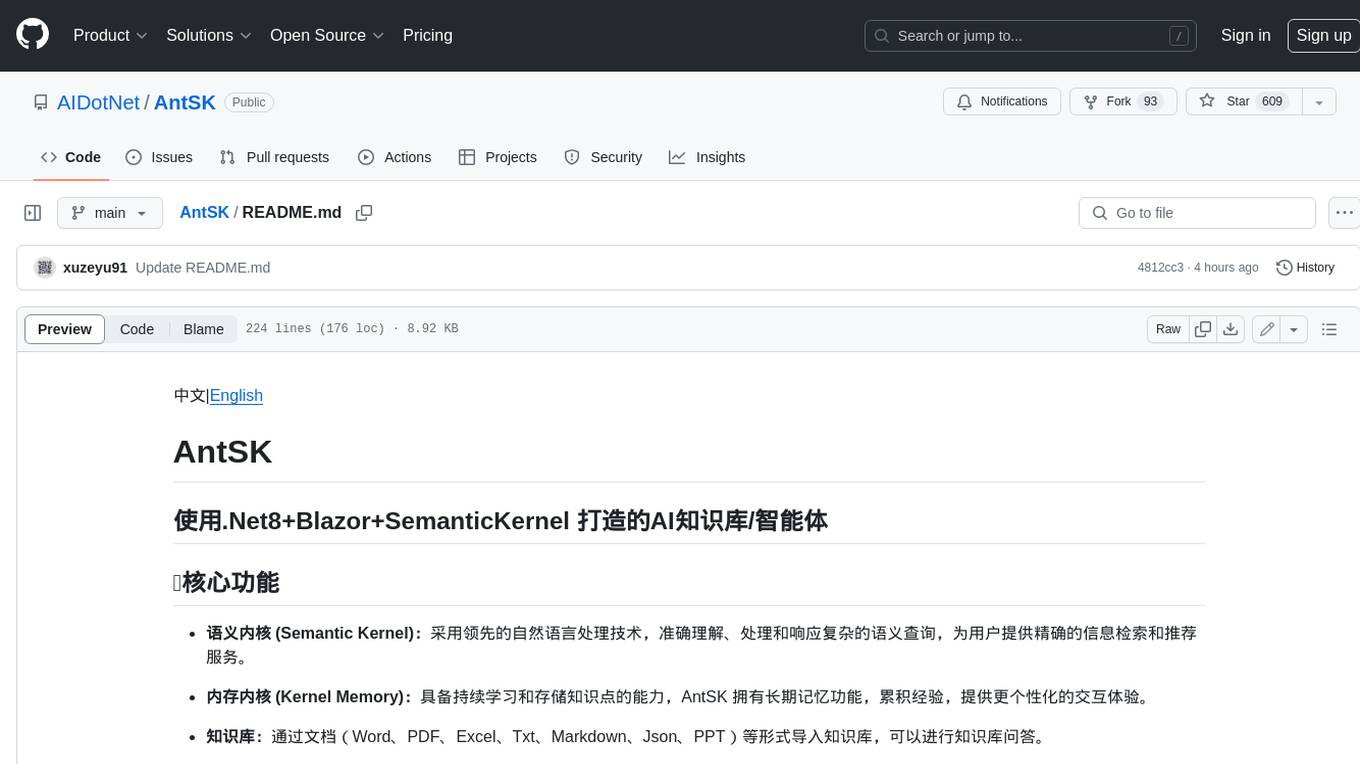
AntSK
AntSK is an AI knowledge base/agent built with .Net8+Blazor+SemanticKernel. It features a semantic kernel for accurate natural language processing, a memory kernel for continuous learning and knowledge storage, a knowledge base for importing and querying knowledge from various document formats, a text-to-image generator integrated with StableDiffusion, GPTs generation for creating personalized GPT models, API interfaces for integrating AntSK into other applications, an open API plugin system for extending functionality, a .Net plugin system for integrating business functions, real-time information retrieval from the internet, model management for adapting and managing different models from different vendors, support for domestic models and databases for operation in a trusted environment, and planned model fine-tuning based on llamafactory.
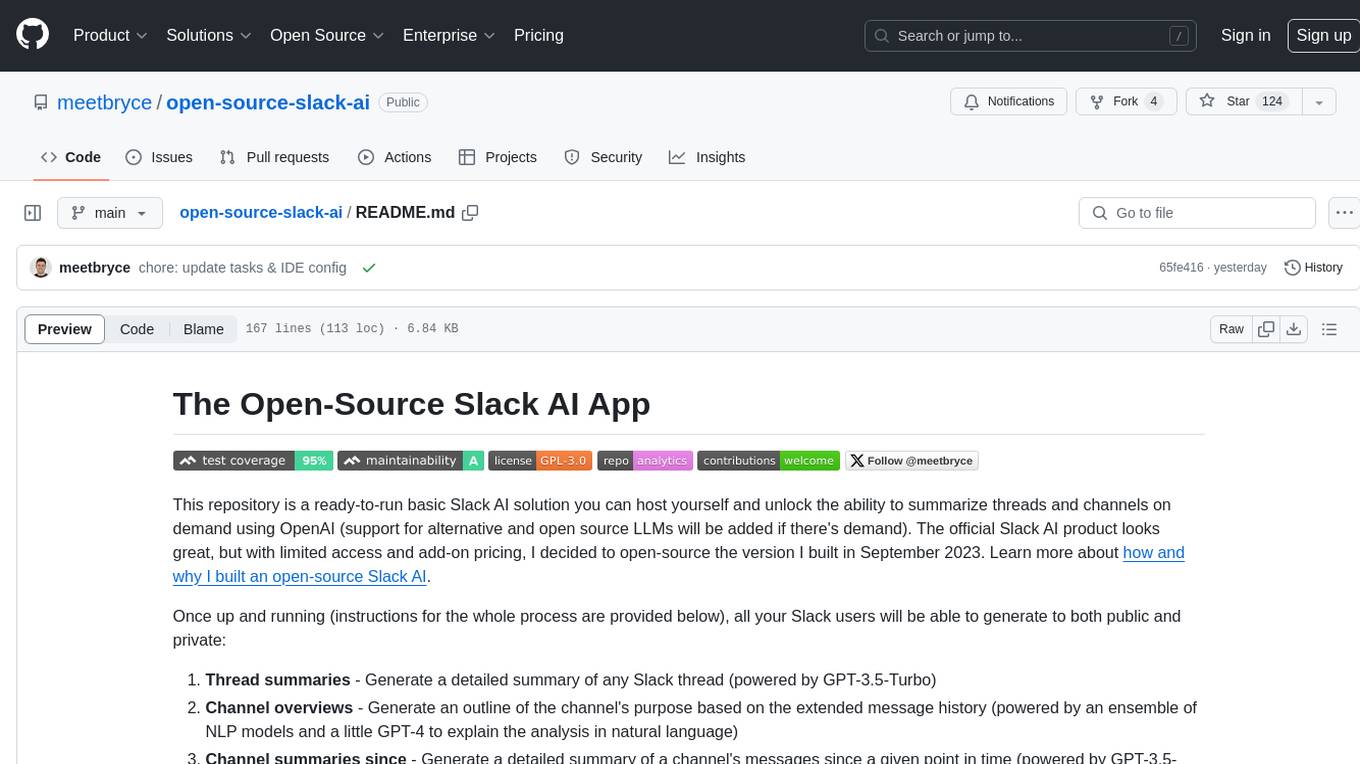
open-source-slack-ai
This repository provides a ready-to-run basic Slack AI solution that allows users to summarize threads and channels using OpenAI. Users can generate thread summaries, channel overviews, channel summaries since a specific time, and full channel summaries. The tool is powered by GPT-3.5-Turbo and an ensemble of NLP models. It requires Python 3.8 or higher, an OpenAI API key, Slack App with associated API tokens, Poetry package manager, and ngrok for local development. Users can customize channel and thread summaries, run tests with coverage using pytest, and contribute to the project for future enhancements.
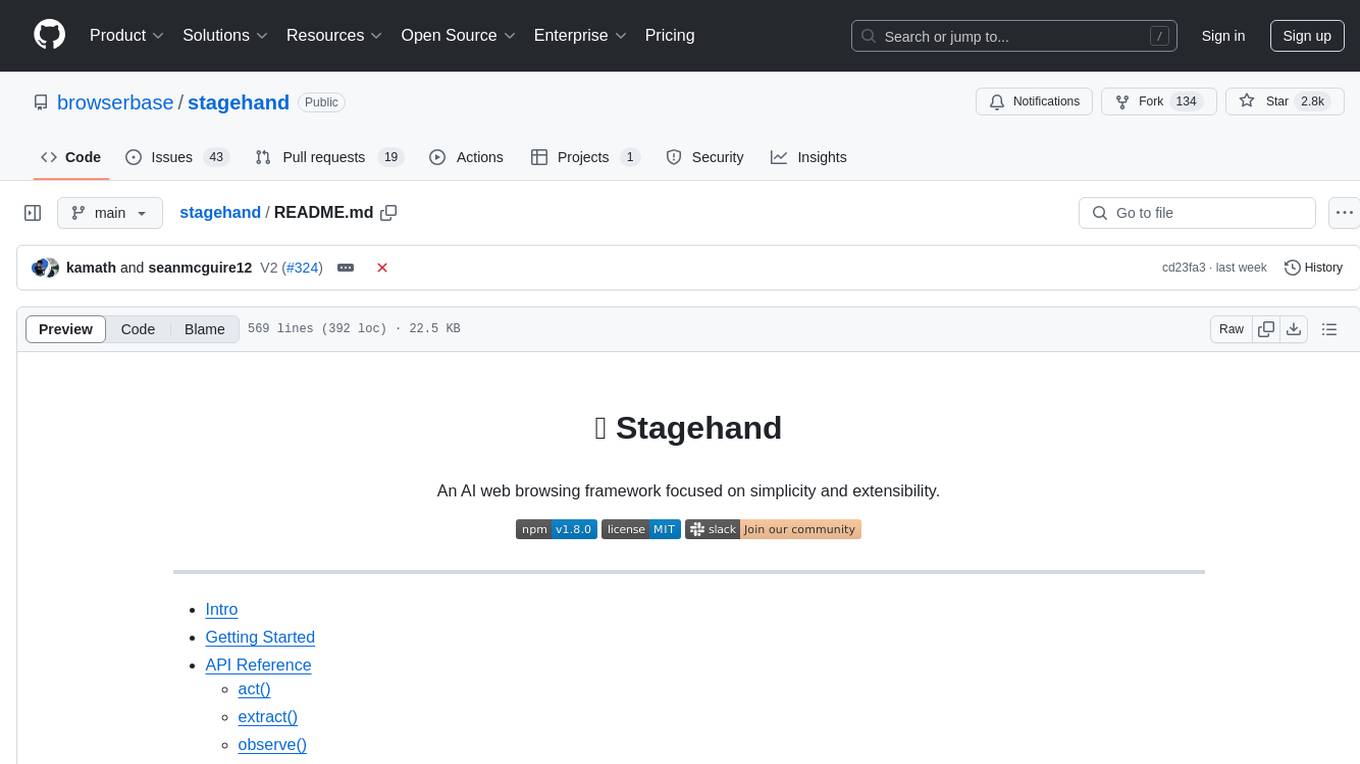
stagehand
Stagehand is an AI web browsing framework that simplifies and extends web automation using three simple APIs: act, extract, and observe. It aims to provide a lightweight, configurable framework without complex abstractions, allowing users to automate web tasks reliably. The tool generates Playwright code based on atomic instructions provided by the user, enabling natural language-driven web automation. Stagehand is open source, maintained by the Browserbase team, and supports different models and model providers for flexibility in automation tasks.

Sentient
Sentient is a personal, private, and interactive AI companion developed by Existence. The project aims to build a completely private AI companion that is deeply personalized and context-aware of the user. It utilizes automation and privacy to create a true companion for humans. The tool is designed to remember information about the user and use it to respond to queries and perform various actions. Sentient features a local and private environment, MBTI personality test, integrations with LinkedIn, Reddit, and more, self-managed graph memory, web search capabilities, multi-chat functionality, and auto-updates for the app. The project is built using technologies like ElectronJS, Next.js, TailwindCSS, FastAPI, Neo4j, and various APIs.

supervisely
Supervisely is a computer vision platform that provides a range of tools and services for developing and deploying computer vision solutions. It includes a data labeling platform, a model training platform, and a marketplace for computer vision apps. Supervisely is used by a variety of organizations, including Fortune 500 companies, research institutions, and government agencies.
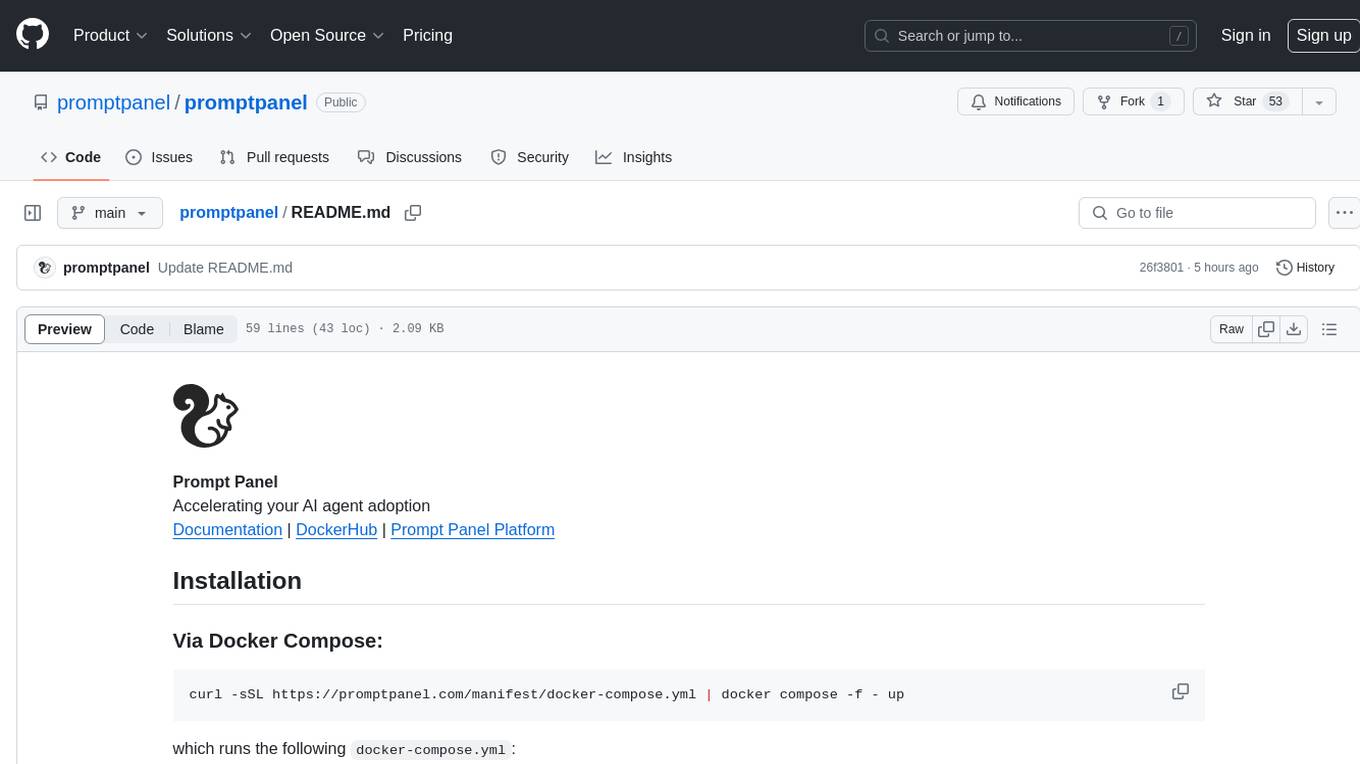
promptpanel
Prompt Panel is a tool designed to accelerate the adoption of AI agents by providing a platform where users can run large language models across any inference provider, create custom agent plugins, and use their own data safely. The tool allows users to break free from walled-gardens and have full control over their models, conversations, and logic. With Prompt Panel, users can pair their data with any language model, online or offline, and customize the system to meet their unique business needs without any restrictions.
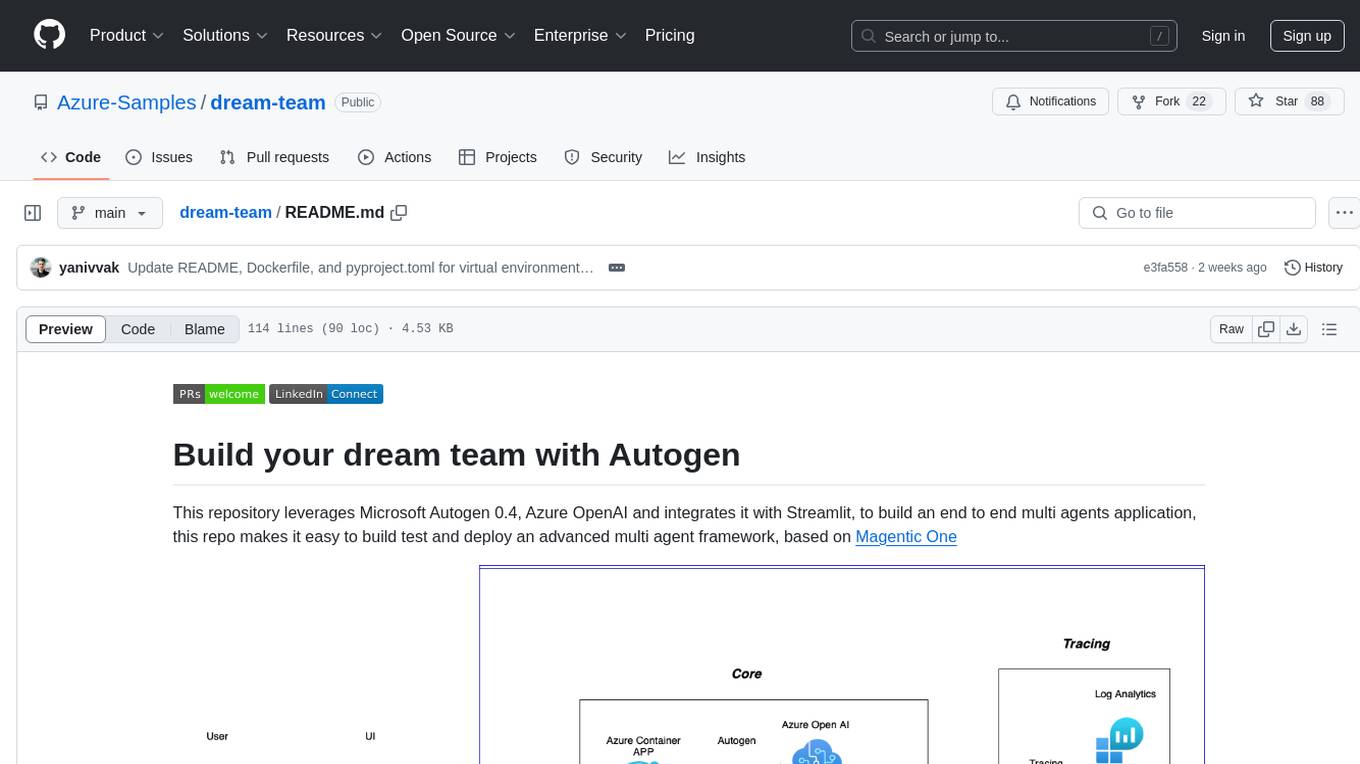
dream-team
Build your dream team with Autogen is a repository that leverages Microsoft Autogen 0.4, Azure OpenAI, and Streamlit to create an end-to-end multi-agent application. It provides an advanced multi-agent framework based on Magentic One, with features such as a friendly UI, single-line deployment, secure code execution, managed identities, and observability & debugging tools. Users can deploy Azure resources and the app with simple commands, work locally with virtual environments, install dependencies, update configurations, and run the application. The repository also offers resources for learning more about building applications with Autogen.
For similar tasks

devika
Devika is an advanced AI software engineer that can understand high-level human instructions, break them down into steps, research relevant information, and write code to achieve the given objective. Devika utilizes large language models, planning and reasoning algorithms, and web browsing abilities to intelligently develop software. Devika aims to revolutionize the way we build software by providing an AI pair programmer who can take on complex coding tasks with minimal human guidance. Whether you need to create a new feature, fix a bug, or develop an entire project from scratch, Devika is here to assist you.
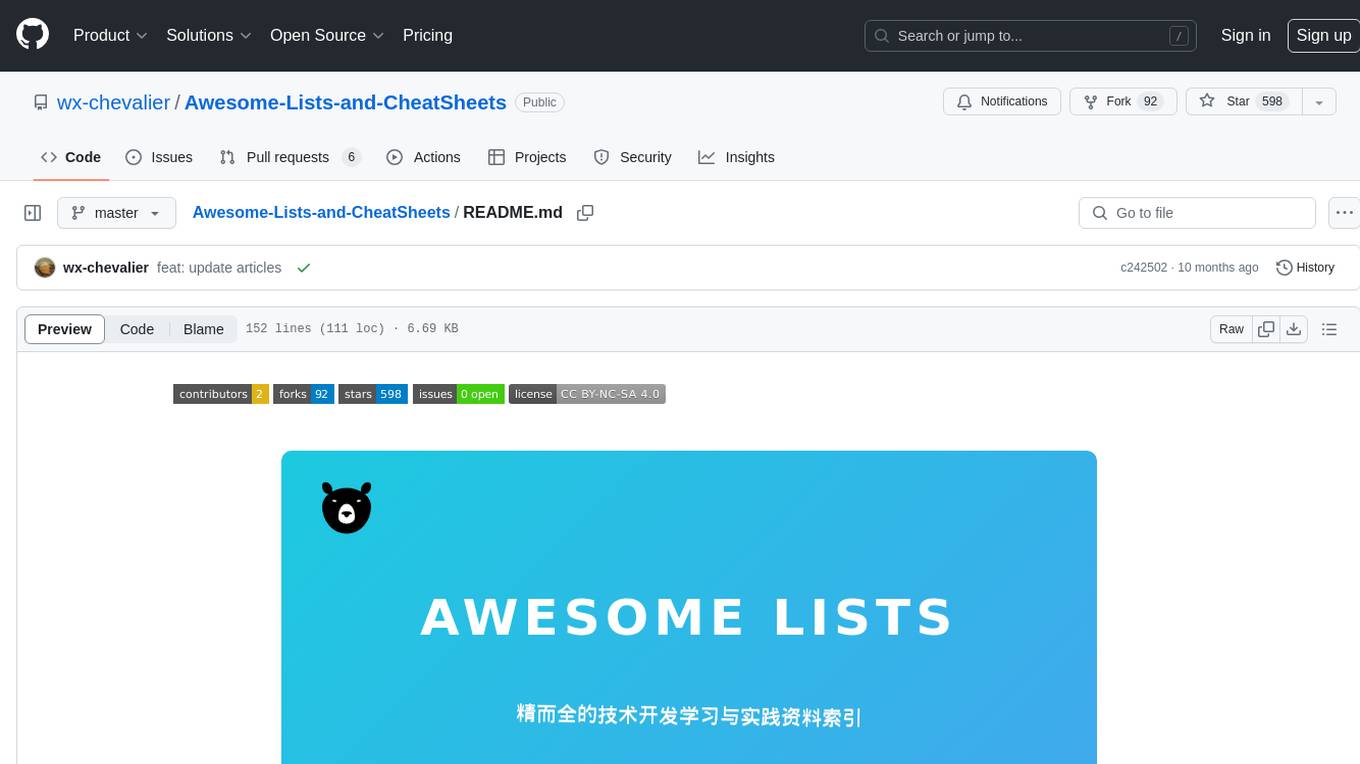
Awesome-Lists-and-CheatSheets
Awesome-Lists is a curated index of selected resources spanning various fields including programming languages and theories, web and frontend development, server-side development and infrastructure, cloud computing and big data, data science and artificial intelligence, product design, etc. It includes articles, books, courses, examples, open-source projects, and more. The repository categorizes resources according to the knowledge system of different domains, aiming to provide valuable and concise material indexes for readers. Users can explore and learn from a wide range of high-quality resources in a systematic way.
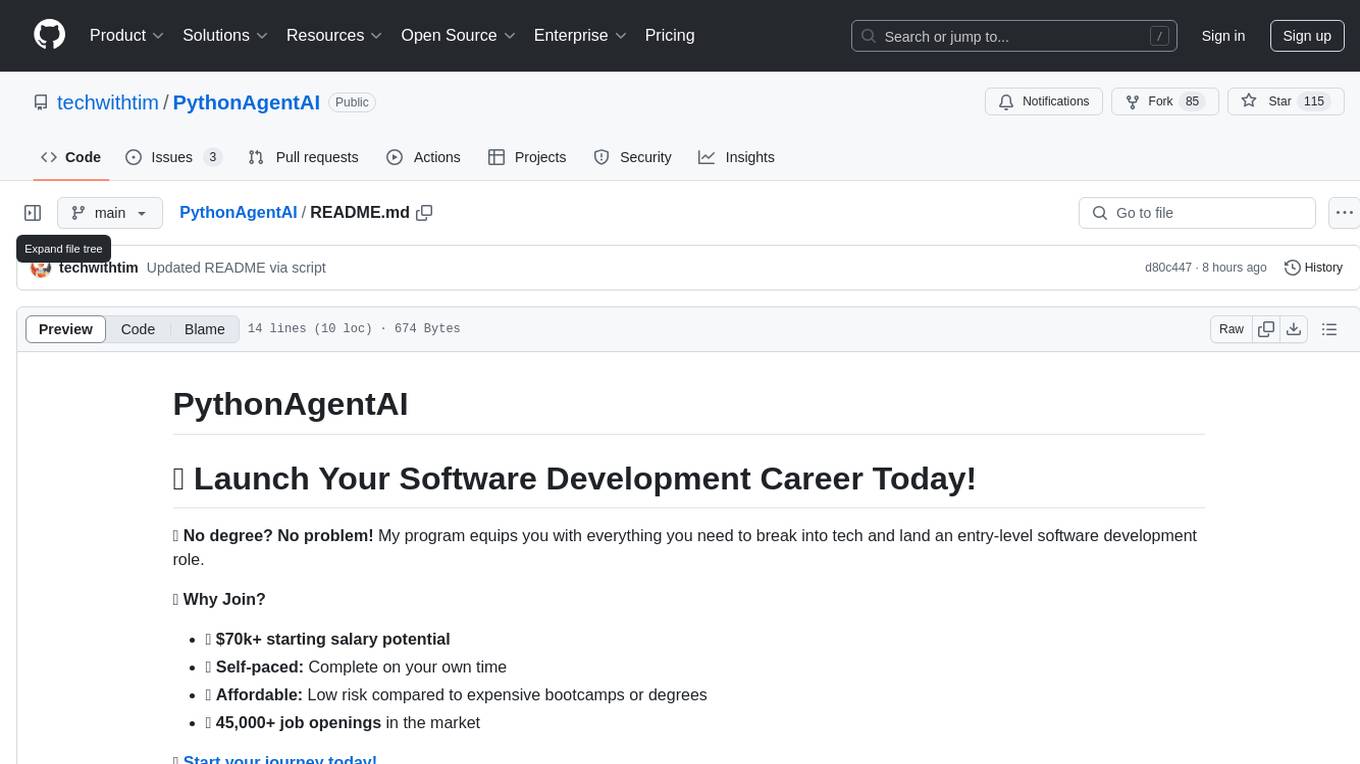
PythonAgentAI
PythonAgentAI is a program designed to help individuals break into the tech industry and land entry-level software development roles. The program offers a self-paced learning experience with the potential for a starting salary of $70k+. It is an affordable alternative to expensive bootcamps or degrees, with a focus on preparing individuals for the 45,000+ job openings in the market. No prior experience is required, making it accessible to anyone determined to future-proof their career and unlock six-figure potential.
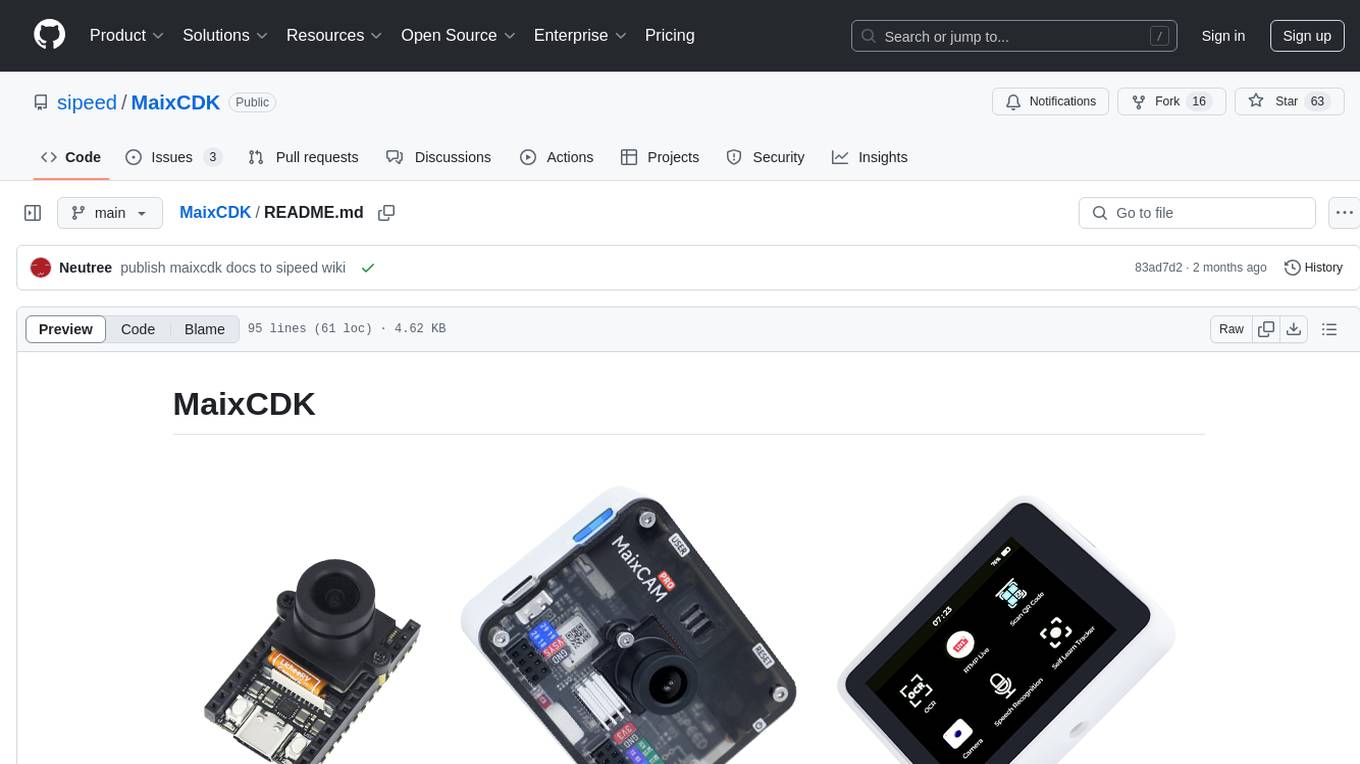
MaixCDK
MaixCDK (Maix C/CPP Development Kit) is a C/C++ development kit that integrates practical functions such as AI, machine vision, and IoT. It provides easy-to-use encapsulation for quickly building projects in vision, artificial intelligence, IoT, robotics, industrial cameras, and more. It supports hardware-accelerated execution of AI models, common vision algorithms, OpenCV, and interfaces for peripheral operations. MaixCDK offers cross-platform support, easy-to-use API, simple environment setup, online debugging, and a complete ecosystem including MaixPy and MaixVision. Supported devices include Sipeed MaixCAM, Sipeed MaixCAM-Pro, and partial support for Common Linux.
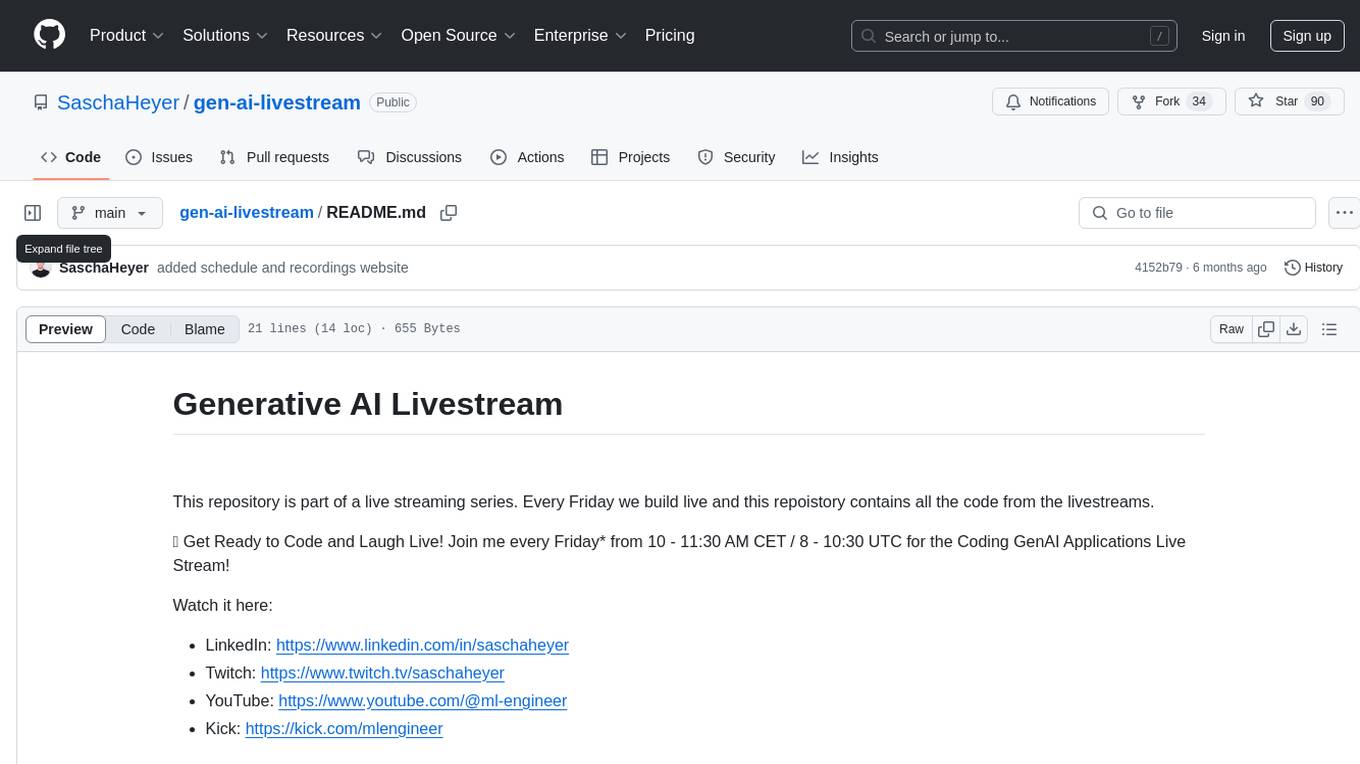
gen-ai-livestream
Generative AI Livestream is a repository containing all the code from a live streaming series where applications using generative AI are built every Friday. The live streams are scheduled from 10 - 11:30 AM CET / 8 - 10:30 UTC. Viewers can join to code and laugh live while learning about coding GenAI applications. The repository serves as a resource for those who want to follow along with the live streams and access the code discussed during the sessions.
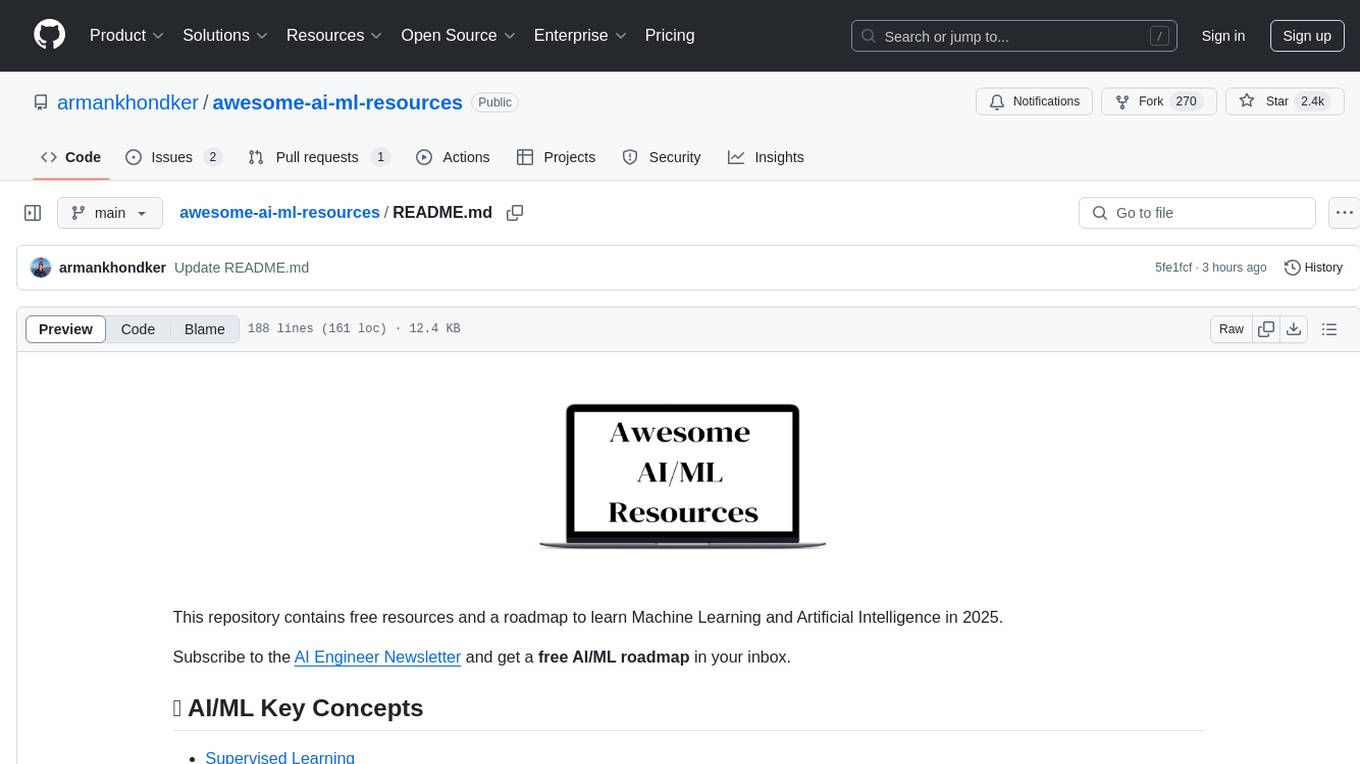
awesome-ai-ml-resources
This repository is a collection of free resources and a roadmap designed to help individuals learn Machine Learning and Artificial Intelligence concepts by providing key concepts, building blocks, roles, a learning roadmap, courses, certifications, books, tools & frameworks, research blogs, applied blogs, practice problems, communities, YouTube channels, newsletters, and must-read papers. It covers a wide range of topics from supervised learning to MLOps, offering guidance on learning paths, practical experience, and job interview preparation.

sweep
Sweep is an AI junior developer that turns bugs and feature requests into code changes. It automatically handles developer experience improvements like adding type hints and improving test coverage.
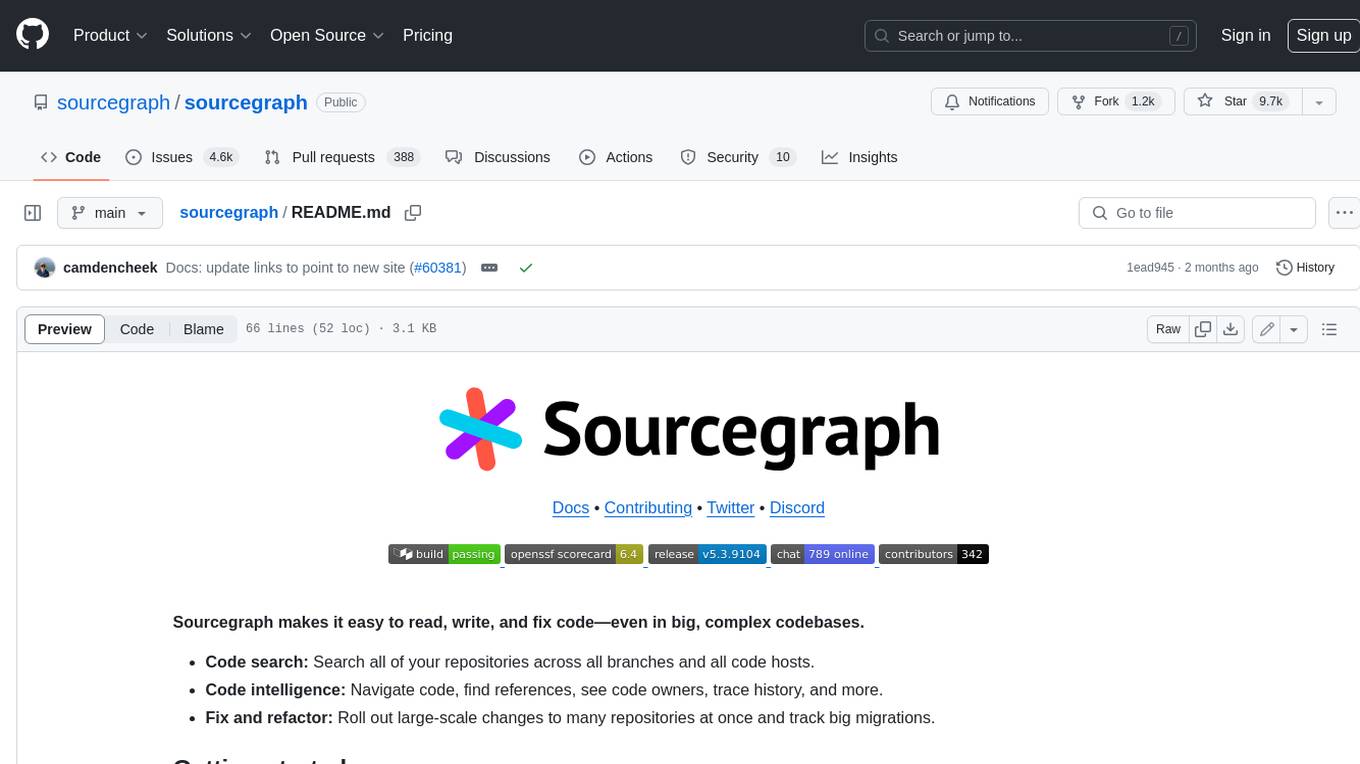
sourcegraph
Sourcegraph is a code search and navigation tool that helps developers read, write, and fix code in large, complex codebases. It provides features such as code search across all repositories and branches, code intelligence for navigation and refactoring, and the ability to fix and refactor code across multiple repositories at once.
For similar jobs

sweep
Sweep is an AI junior developer that turns bugs and feature requests into code changes. It automatically handles developer experience improvements like adding type hints and improving test coverage.

teams-ai
The Teams AI Library is a software development kit (SDK) that helps developers create bots that can interact with Teams and Microsoft 365 applications. It is built on top of the Bot Framework SDK and simplifies the process of developing bots that interact with Teams' artificial intelligence capabilities. The SDK is available for JavaScript/TypeScript, .NET, and Python.

ai-guide
This guide is dedicated to Large Language Models (LLMs) that you can run on your home computer. It assumes your PC is a lower-end, non-gaming setup.

classifai
Supercharge WordPress Content Workflows and Engagement with Artificial Intelligence. Tap into leading cloud-based services like OpenAI, Microsoft Azure AI, Google Gemini and IBM Watson to augment your WordPress-powered websites. Publish content faster while improving SEO performance and increasing audience engagement. ClassifAI integrates Artificial Intelligence and Machine Learning technologies to lighten your workload and eliminate tedious tasks, giving you more time to create original content that matters.

chatbot-ui
Chatbot UI is an open-source AI chat app that allows users to create and deploy their own AI chatbots. It is easy to use and can be customized to fit any need. Chatbot UI is perfect for businesses, developers, and anyone who wants to create a chatbot.

BricksLLM
BricksLLM is a cloud native AI gateway written in Go. Currently, it provides native support for OpenAI, Anthropic, Azure OpenAI and vLLM. BricksLLM aims to provide enterprise level infrastructure that can power any LLM production use cases. Here are some use cases for BricksLLM: * Set LLM usage limits for users on different pricing tiers * Track LLM usage on a per user and per organization basis * Block or redact requests containing PIIs * Improve LLM reliability with failovers, retries and caching * Distribute API keys with rate limits and cost limits for internal development/production use cases * Distribute API keys with rate limits and cost limits for students

uAgents
uAgents is a Python library developed by Fetch.ai that allows for the creation of autonomous AI agents. These agents can perform various tasks on a schedule or take action on various events. uAgents are easy to create and manage, and they are connected to a fast-growing network of other uAgents. They are also secure, with cryptographically secured messages and wallets.

griptape
Griptape is a modular Python framework for building AI-powered applications that securely connect to your enterprise data and APIs. It offers developers the ability to maintain control and flexibility at every step. Griptape's core components include Structures (Agents, Pipelines, and Workflows), Tasks, Tools, Memory (Conversation Memory, Task Memory, and Meta Memory), Drivers (Prompt and Embedding Drivers, Vector Store Drivers, Image Generation Drivers, Image Query Drivers, SQL Drivers, Web Scraper Drivers, and Conversation Memory Drivers), Engines (Query Engines, Extraction Engines, Summary Engines, Image Generation Engines, and Image Query Engines), and additional components (Rulesets, Loaders, Artifacts, Chunkers, and Tokenizers). Griptape enables developers to create AI-powered applications with ease and efficiency.
